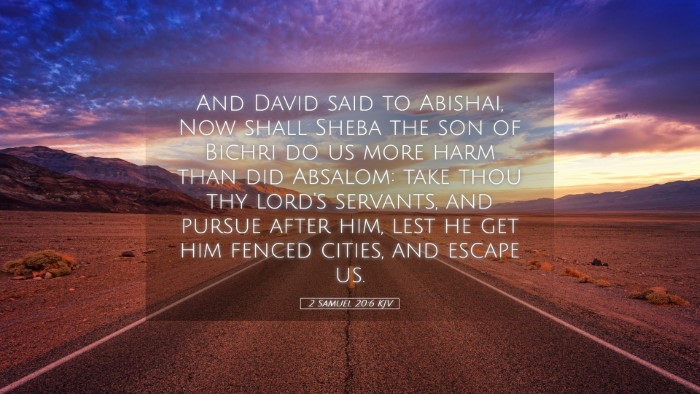Commentary on 2 Samuel 20:6
Verse Reference: 2 Samuel 20:6 - "And David said to Abishai, Now shall Sheba the son of Bichri do us more harm than Absalom. Take thou thy Lord's servants, and pursue after him, lest he get him fenced cities, and escape us."
Contextual Background
The socio-political climate during the reign of King David was marked by significant strife, particularly following the rebellion of Absalom. Absalom's revolt saw David face immense challenges and ultimately led to his temporary exile from Jerusalem. Following Absalom's defeat and death, the nation of Israel experienced unrest and division. Sheba, the son of Bichri, took this opportunity to incite further rebellion, compelling David to act decisively.
Exegesis and Insights
This verse articulates David's recognition of the potential threat posed by Sheba's rebellion. David's concern is emphasized in his dialogue with Abishai, one of his valiant warriors. The urgency in David's words underlines the notion that internal strife can be as perilous as external enemies.
Key Themes
- The Weight of Leadership: David's leadership is put to the test. His discernment in recognizing threats and taking preventive measures speaks to the heavy responsibility entrusted to leaders. This theme resonates deeply with current church leaders who face similar challenges in guiding their congregations amidst division.
- Urgency in Action: David's command to pursue Sheba reflects the urgency of addressing sin and rebellion within the community. It reinforces the principle that timely intervention can prevent greater calamity.
- The Nature of Rebellion: Sheba's revolt highlights the persistent nature of rebellion against rightful authority. Those in academia can draw parallels between this historical account and modern-day challenges in authority structures within religious and secular institutions.
Theological Implications
This passage invites theological reflection on God’s sovereignty and the fragility of human leadership. David’s reliance on God amidst tumultuous conditions illustrates a core biblical theme where divine providence coexists with human initiative. It prompts leaders to simultaneously seek divine guidance and act decisively in the face of challenges.
Commentator Insights
Matthew Henry
Matthew Henry emphasizes the seriousness with which David views Sheba's threat, paralleling it with the preceding dangers posed by Absalom. He notes that David comprehends the potential for chaos and destruction that could arise from Sheba's insurrection, stressing the importance of prompt decisive action. Henry elaborates on the verse by highlighting David's wisdom in choosing his military leader—Abishai—and assembling loyal servants to quell the insurgency.
Albert Barnes
Albert Barnes provides an in-depth look into the motivations of Sheba. He suggests that Sheba’s actions stem from a desire for personal gain and influence rather than a legitimate cause or faction. Barnes argues that David's proactive strategy serves as a lesson for leaders today, advocating for vigilance and strategic response to emerging threats within their communities.
Adam Clarke
Adam Clarke offers a historical perspective, noting the significance of the cities mentioned in David's concern. He highlights that these fortified cities would provide refuge and a stronghold for Sheba, thus increasing his power and influence against David’s rule. Clarke’s commentary emphasizes the necessity for leaders to remain vigilant, as unrest could lead to insurmountable challenges, both politically and spiritually.
Practical Applications
- Addressing Internal Division: Religious leaders are encouraged to recognize and address factions or divisive behaviors within their congregations swiftly.
- Promoting Unity: This narrative alerts leaders to foster unity among their followers to prevent escalated conflicts that may disrupt the community's harmony.
- The Role of Prayer and Wisdom: Recognizing the necessity of prayer in seeking God’s guidance during turbulent times is crucial, exemplifying how divine wisdom should inform human actions.
Conclusion
2 Samuel 20:6 serves as a poignant reminder of the complexities of leadership amidst turmoil. The responses and actions of David provide valuable lessons for contemporary leaders in both ecclesiastical and secular realms. The insights from respected commentators deepen our understanding of this passage, promoting a holistic approach to dealing with rebellion and strife while emphasizing the necessity of divine guidance, unity, and immediate action. For pastors, students, theologians, and Bible scholars, these reflections can nurture both personal and communal growth in faith and leadership.


